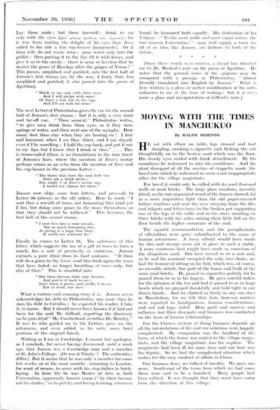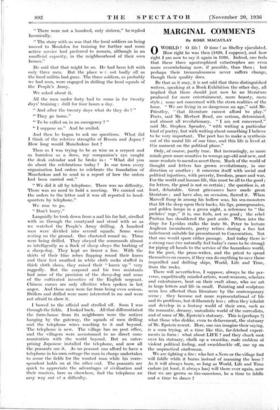MOVING WITH THE TIMES IN MANCHUKUO
By RALPH MORTON
HE sat with elbow on table, legs crossed and foot dangling, smoking a cigarette and flicking the ash thoughtfully on to the beaten mud which was the floor. His steady eyes smiled with frank detachment. By his casualness he welcomed us into his confidence. And his aloof disregard of all the niceties of etiquette made the hovel into which he welcomed us seem a not inappropriate office for the village magistrate.
For hovel it could only be called with its mud floor and walls of mud bricks. The large glass windows, recently fitted, as the raw unpainted wood of the frames showed, let in a more inquisitive light than the old paper-covered lattice windows and sent the eyes straying from the files and inkpots and letter-trays to the broken pot supporting one of the legs of the table and to the stove standing on three bricks with the ashes raising their little hill on the floor beside the higher mountain of the coal.
The squalid accommodation and the paraphernalia of officialdom were quite subordinated to the sense of human intercourse. A fussy official would have made his files and stamps seem out of place in such a stable. A more courteous host might have made us conscious of the ubiquitous mud. Our host waved us to a seat and, as he and his assistant occupied the only two chairs, we had the honour of sitting on his bed, which was, of course, no movable article, but part of the house and built of the same mud bricks. He passed us cigarettes politely for he passed them to us in his fingers. He gave careful orders for the infusion of the tea and had it passed to us in large bowls which we grasped thankfully and held tight in our frozen hands. And we chatted as freely as any one does in Manchukuo, for we felt that here, however matters were reported to headquarters, human considerations. and not red tape, ruled. Here graft and squeeze and influence lost their disrepute and business was conducted on the basis of human relationships.
For the Chinese system of doing business depends on all the interrelations of life and our relations were happily complicated. My companion was the landlord of the farm, of which the house was rented to the village magis- trate, and the village magistrate was his nephew. The magistrate had been ill for some time and our host was his deputy. So we had the complicated situation which makes for the easy conduct of affairs in China.
Our business done, we talked of bandits. We gave our news. South-east of the town from which we had come there were said to be a hundred. Many people had been robbed. It was thought that they must have come from the direction of this village. " There were not a hundred, only sixteen," he replied laconically.
" The story with us was that the local soldiers on being moved to Moukden for training for further and more active service had preferred to remain, although in an unofficial capacity, in the neighbourhood of their own homes."
He said that that might be so. He had been left with only three men. But the place w. not badly off as the local militia had guns. The three soldiers, as probably we had seen, were engaged in drilling the local squads of the People's Army.
We asked about it.
All the men under forty had to come in for twenty days' training : drill for four hours a day.
" And after the twenty days what do they do ? " " They go home."
" To be called on in an emergency ? "
" I suppose so." And he smiled.
And then he began to ask me questions. What did I think of the relative strengths of Russia and Japan ? How long would Manchukuo last ?
Then as I was trying to be as wise as a serpent and as harmless as a dove, my companion's eye caught the desk calendar and he broke in : " What did you do about the celebrations today ? In our town every organisation had orders to celebrate the foundation of Manchukuo and to send in a report of how the orders had been carried out."
" We did it all by telephone. There was no difficulty. There was no need to hold a meeting. We carried out the orders to the letter and it was all reported to head- quarters by telephone."
We rose to go.
" Don't hurry."
Languidly he took down from a nail his fur hat, strolled with us through the 'courtyard and stood with us as we watched the People's Army drilling. A hundred men were divided into' several squads: Some were resting on the ground. One clustered round us. Three were being drilled.They obeyed the commands almost as intelligently as a. flock of sheep obeys- the barking of a sheep-dog. They kept no firmer a line. With the skirts of their blue robes flapping round their knees and their feet swathed in white cloth socks stuffed in thick cloth shoes, they raised their " kneei up " very raggedly. But the corporal and his two assistants had none of the precision of the sheep-dog and none of the cultivated invective of the English sergeant. Chinese curses are only effective when Spoken in hot anger. And these men were far from being even serious. Drillers and drilled were more interested in me and were not afraid to show it.
I bowed to the official and strolled off. Soon I was through the fields. I looked back. All that differentiated the farm-house from its neighbours were the notices hanging by the gateway, the squads of men drilling and the telephone wires reaching to it and beyond. The telephone is new. The village has no post office, and the villagers were accustomed to no direct com- munication with the world beyond. But an enter- prising Japanese installed the telephone, and now all the'peasants use it. As no peasant can afford to have a telephone in his own cottage the man in charge undertakes' to scour the fields for the wanted man while his borre,- spondent holds on at the other end. The peasants are quick to appreciate the advantages of civilisation and their masters, here as elsewhere, find 'the telephone an easy way out of a difficulty.





























































 Previous page
Previous page